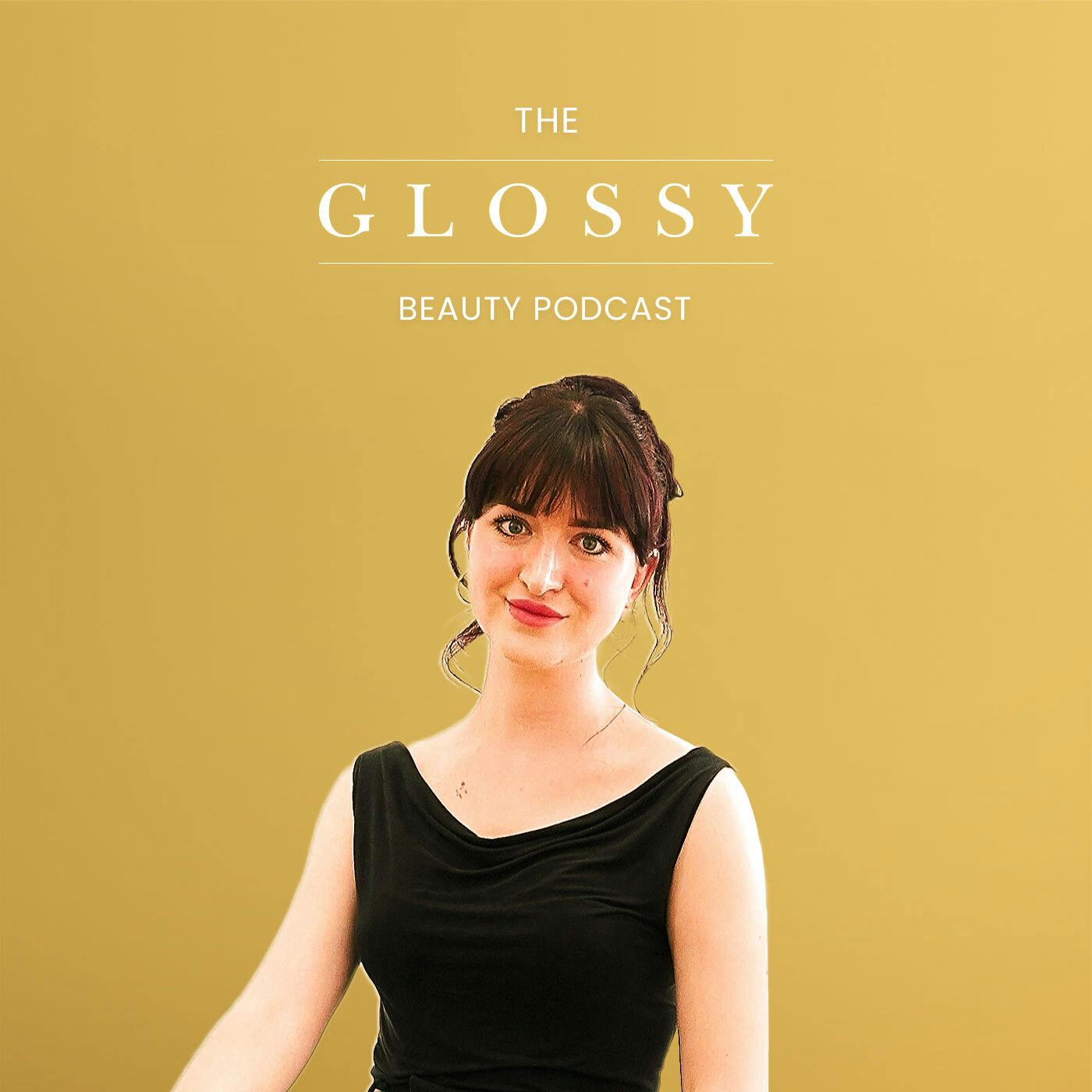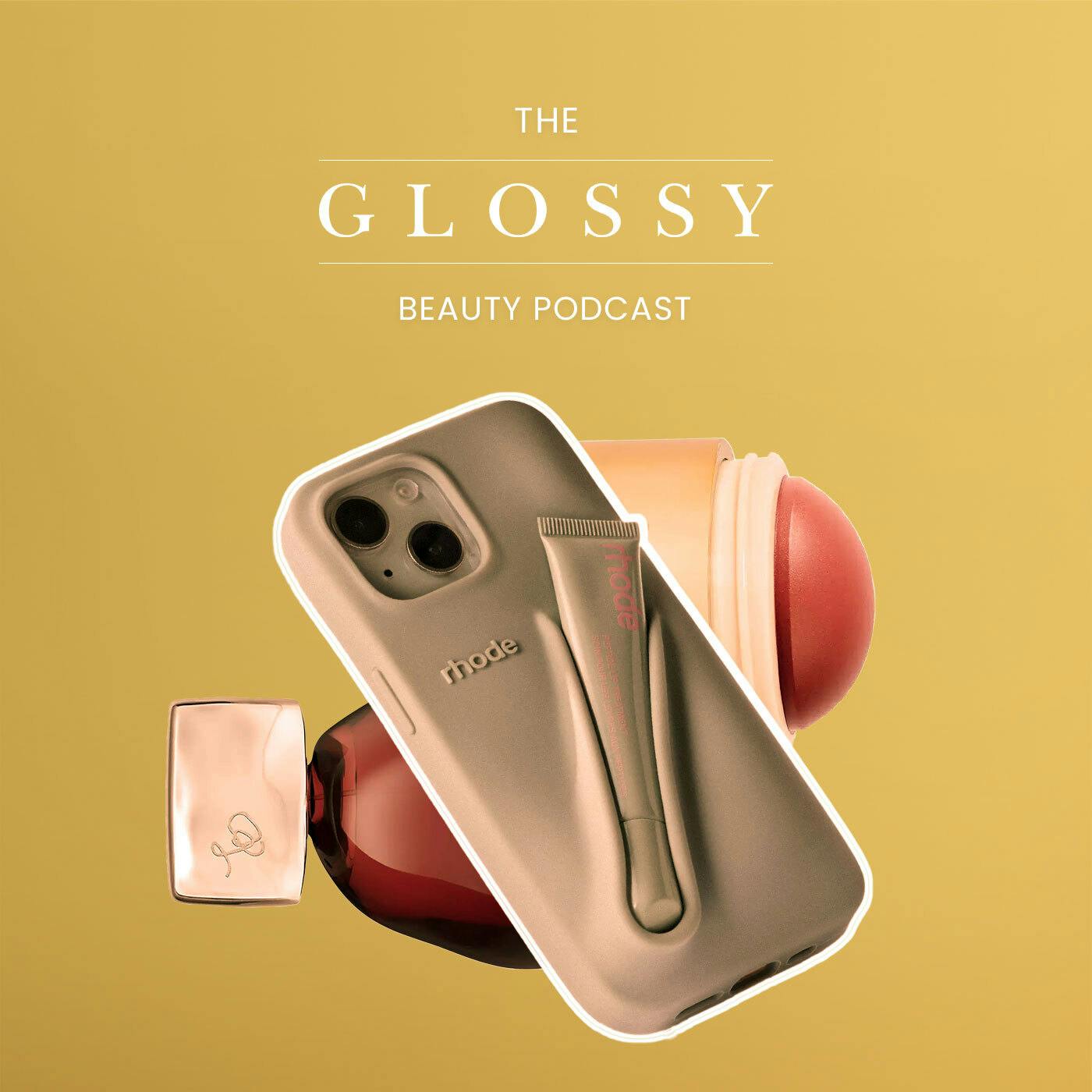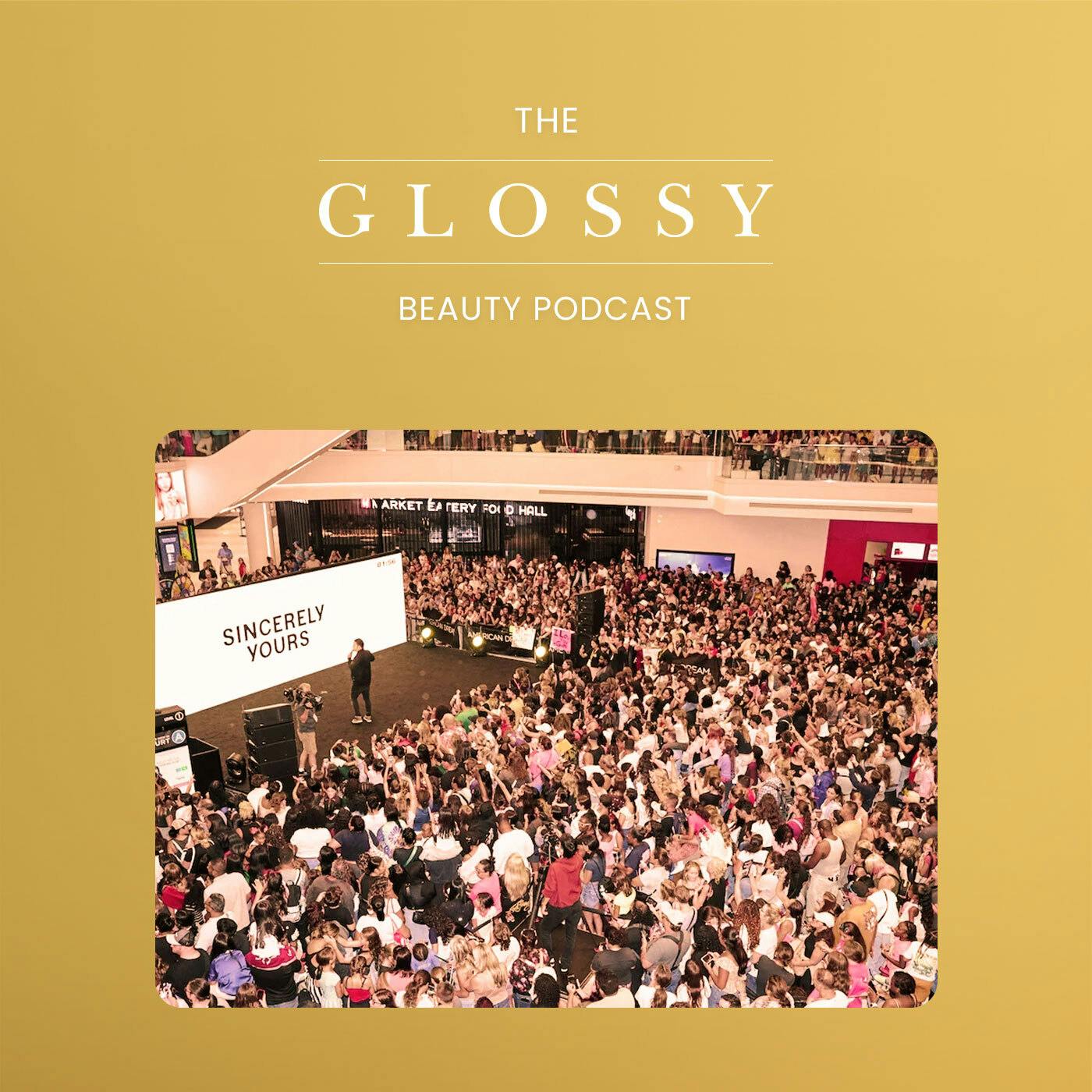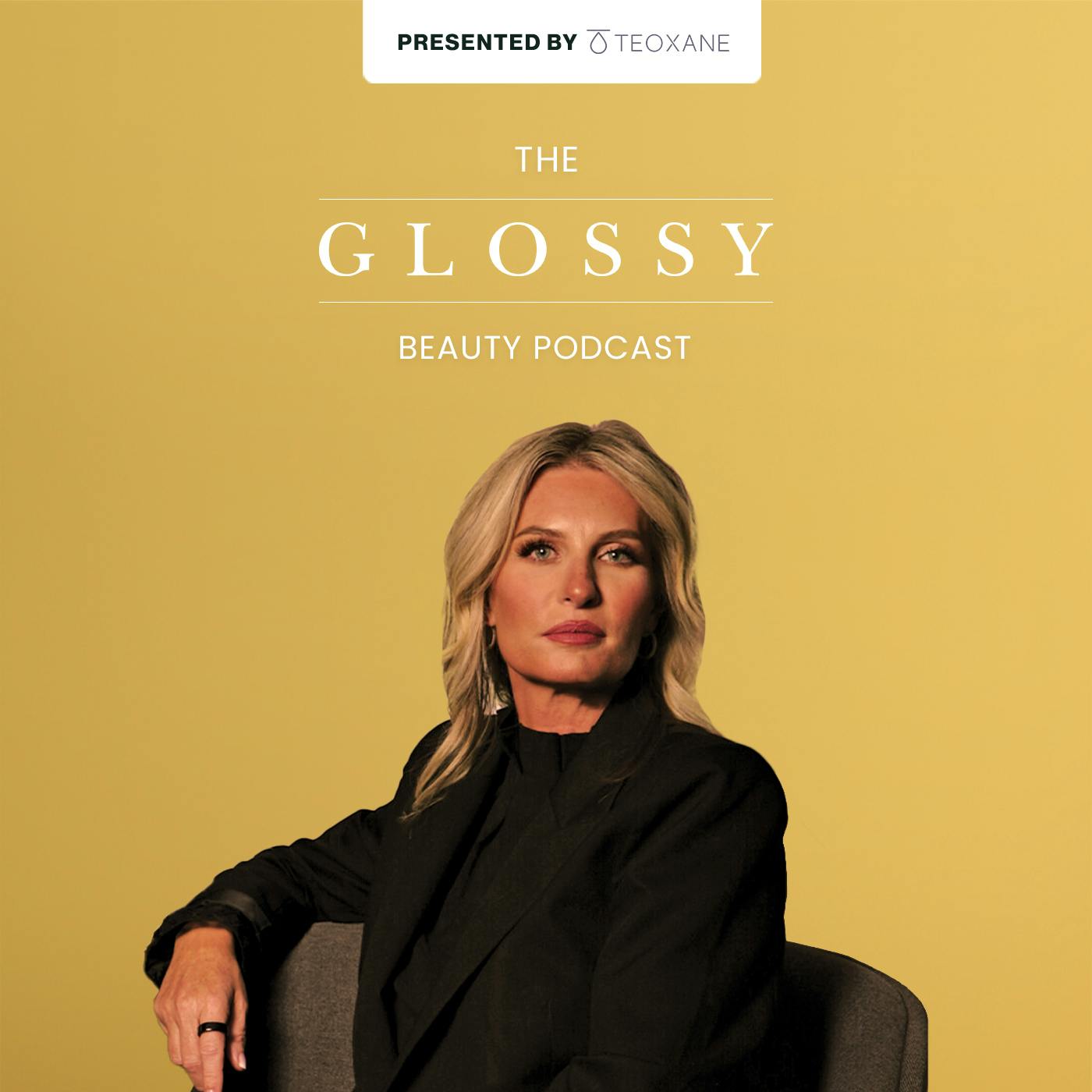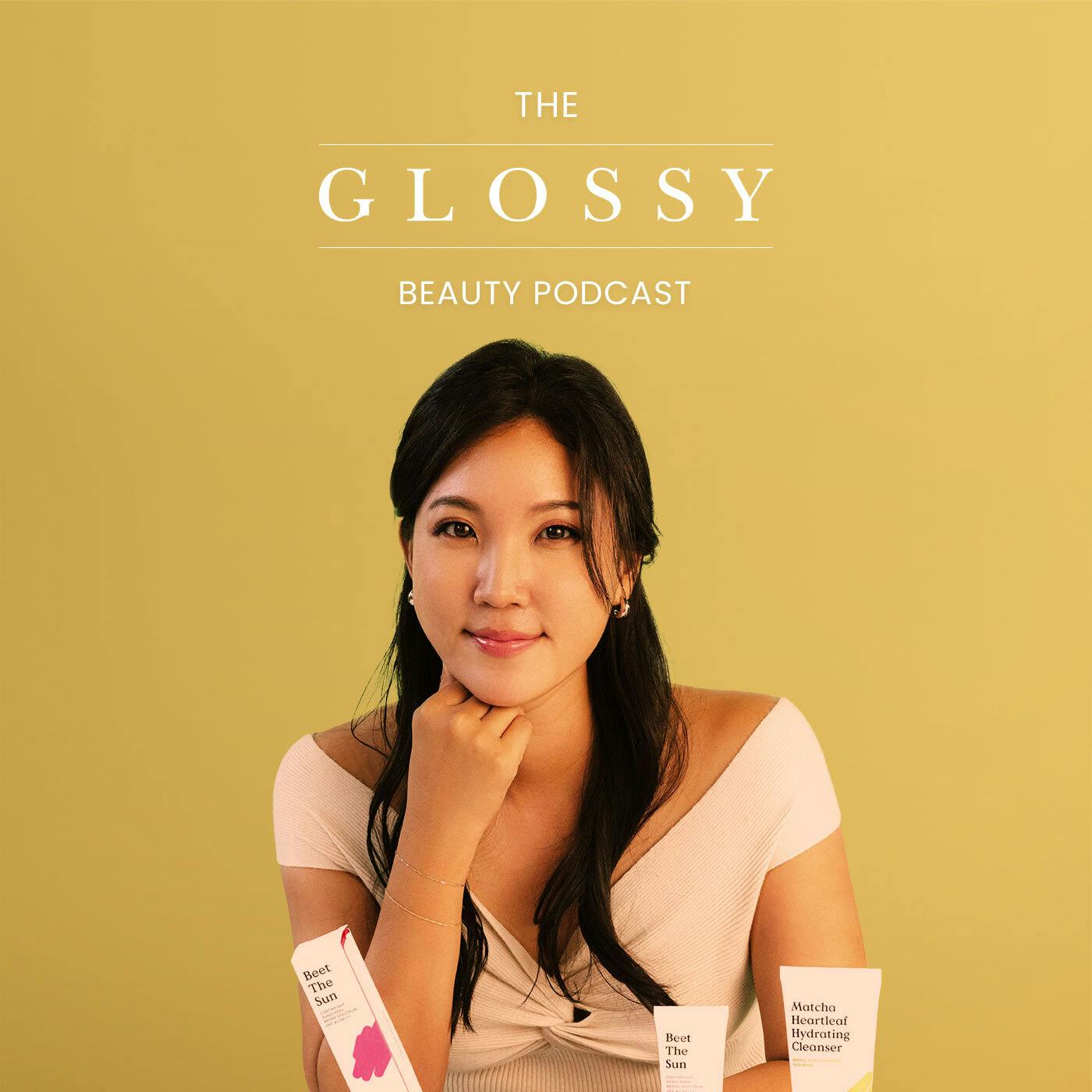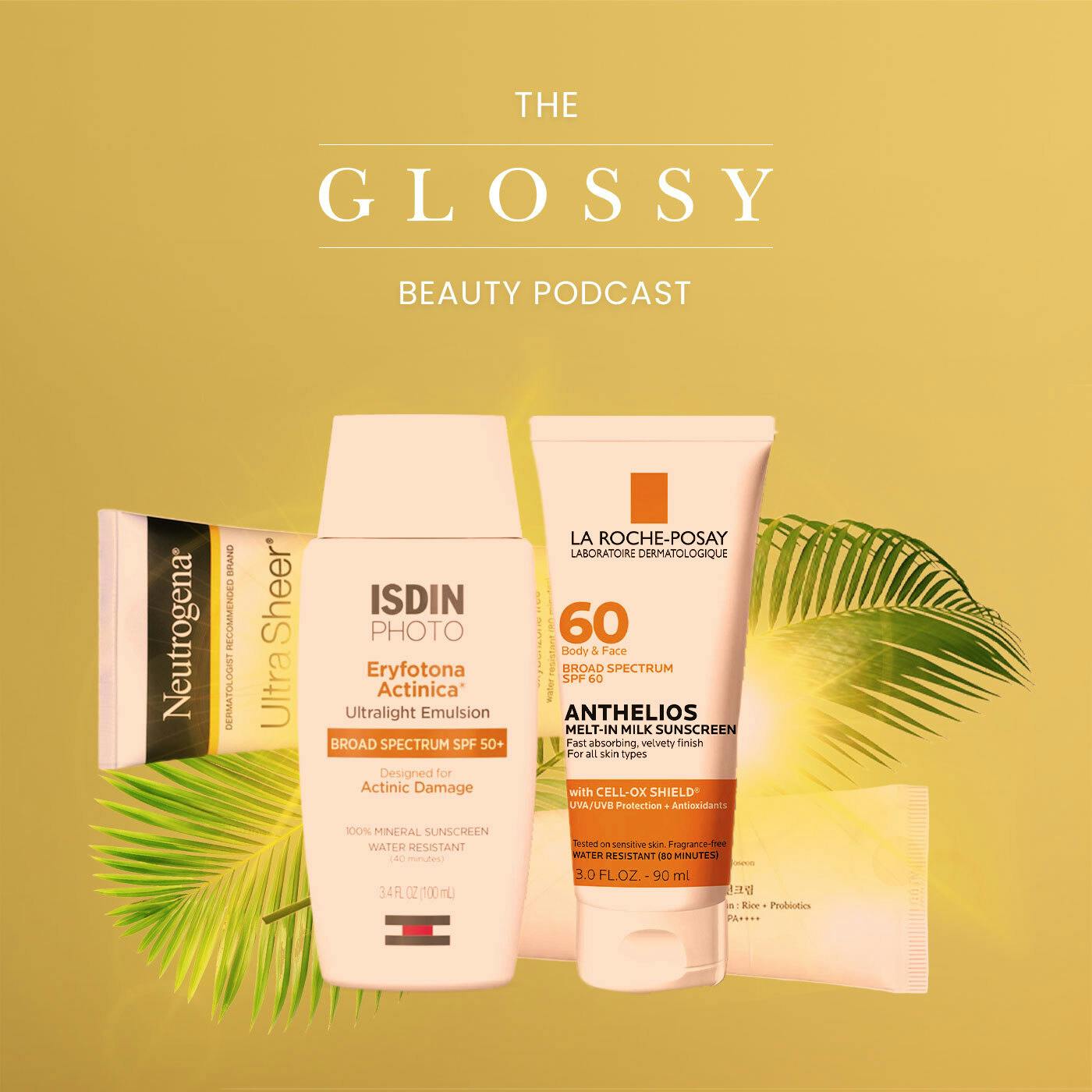Discover The Glossy Beauty Podcast
The Glossy Beauty Podcast

The Glossy Beauty Podcast
Author: Glossy
Subscribed: 268Played: 7,231Subscribe
Share
Description
The Glossy Beauty Podcast is the newest podcast from Glossy. Each episode features candid conversations about how today’s trends, such as CBD and self-care, are shaping the future of the beauty and wellness industries. With a unique assortment of guests, The Glossy Beauty Podcast provides its listeners with a variety of insights and approaches to these categories, which are experiencing explosive growth. From new retail strategies on beauty floors to the importance of filtering skincare products through crystals, this show sets out to help listeners understand everything that is going on today, and prepare for what will show up in their feeds tomorrow.
364 Episodes
Reverse
In January, Kecia Steelman became one of the most powerful executives in beauty.
After more than a decade at Ulta Beauty in positions like COO and head of international, she stepped into the president and CEO role with an uphill battle ahead of her.
That’s because sales at Ulta tumbled during the 2020 pandemic, and despite an uptick in 2021, year-over-year sales had been steadily falling for nearly three years. She took over as CEO in January, and by March, she unveiled her Ulta Beauty Unleashed comeback plan — and in just 11 months, her strategy has paid off.
As part of her vision, Steelman expanded Ulta’s e-commerce and product assortment with a new online marketplace, led the acquisition of U.K. specialty beauty retailer SpaceNK, expanded internationally into Mexico and the Middle East, and shepherded a shop-in-shop breakup with Target, all while dramatically improving revenue.
Sales at Ulta Beauty have been on a continuous upward swing since Steelman took over as CEO in January. In May, the retailer reported 4.5% net sales growth. This doubled to a 9.3% net sales spike, reported in August, and the company nearly tripled that growth in last month’s earnings report.
Host Lexy Lebsack sat down with Steelman to unpack her first year in charge and look ahead to 2026 (16:50). But today’s episode also celebrates Glossy 50, our annual award list honoring business leaders, changemakers and insiders behind the beauty, wellness and fashion industries. Steelman’s interview is a special Glossy50 preview with the full list publishing next week.
But first, Lebsack is joined by co-host Emily Jensen to break down the news of the week. This includes the novel launch of a new "bedtime fragrance" from the U.K. sleep-solution company This Works. The brand is known for its pillow spray and body oil, which include ingredients such as lavender and magnesium, but this week it expanded into fine fragrance designed to be applied before bed to improve sleep.
Lebsack and Jensen also discuss the newest spokesperson for Estée Lauder-owned M.A.C. Cosmetics, pop star Chappell Roan, and the mixed response from her fans online. In addition, they analyze an unexpected collaboration between The Gap and beauty brand Summer Fridays, which includes clothing but not beauty. And finally, the duo discusses the latest moves in the supplement space, including Sephora’s rollback of the category from its selection, and a buzzy new launch from the co-founder and former CEO of Allbirds.
On this week's episode of the Glossy Beauty Podcast, we're exploring what teens are hoping to receive for the holidays. To do so, Sara Spruch-Feiner speaks to 13-year-old Indy (whose last name is omitted for privacy), based in Los Angeles, who shares her full wishlist with us, as well as the picks of members of her volleyball team.
But to get a broader look at the gifting landscape in 2025, Spruch-Feiner also interviewed Anna Andreeva, managing director of footwear, beauty and brands at Piper Sandler. Piper Sandler, a financial services company, is well-known for its biannual teen survey, which, this fall, tapped 11,000 teens, most of whom were 15-18 years old and had an average household income of about $70,000.
But first, a look at some of this week’s headlines, including results of this year's Black Friday and Cyber Monday spending, the FDA's decision to withdraw a proposed rule that would have required beauty brands to test talc-based cosmetics for asbestos contamination, and, finally, the news that LVMH Ventures Fund has invested in the niche perfume brand BDK Parfums.
How can shoppers, brands and retailers win Black Friday?
In this week’s special holiday crossover episode, Glossy Beauty Podcast host Lexy Lebsack is joined by Danny Parisi, host of the Glossy Podcast, and Gabi Barkho, host of the Modern Retail podcast, to unpack all things Black Friday.
The three reporters start by sharing their own experiences and plans for navigating Black Friday as a shopper, then unpack some of the buzziest activations and sales strategies today. This includes both discounting and non-discounting strategies, value-focused sales, bundles and collaborations, among other tactics. The trio also walks through emerging and reemerging trends, like catalogs, gift guides and fragrance-focused experiential events.
Few beauty executives currently compete in a category they created, but that’s the case for Dr. Julie Chung and Kent Yu, the married co-founders behind T3 hair tools (19:00).
The duo created the luxury hair tool category back in 2004 when they launched T3 with the first lightweight, sleek and quiet blowdryer that delivered smoother, faster results. T3’s Featherweight model was the first luxury dryer on the market and the most expensive at the time, priced at $200. Dr. Chung and Yu quickly found a consumer, and before long, T3 was the first hair tool sold in stores like Sephora.
Fast forward 21 years, and they still own and operate 100% of their Los Angeles-based business. The success of T3 created a runway for a category now filled with brands like Dyson and Shark Beauty.
So what is it like to compete in a category you created? Host Lexy Lebsack sat down with Dr. Chung and Yu to learn about their journey to becoming beauty founders, including making time for Dr. Chung’s first career as an eye doctor. They also discuss how they're navigating their biggest challenges, balancing retail and DTC, maintaining NPD standards in a faster-is-better world, and competing within the category.
But first, Lebsack is joined by co-host Emily Jensen to break down the news of the week. This includes the controversial launch of Rini, a line of skin-care products made for kids aged 2-12 and sold DTC. The line was launched earlier this month by actress Shay Mitchell, boyfriend Matte Babel and Esther Song, and received immediate backlash.
Lebsack and Jensen also discuss the launch of Dua by AB, a diffusion line from skin-care founder Augustinus Bader and fronted by singer Dua Lipa. Unfortunately, diffusion lines — defined as secondary, lower-priced product lines from a higher-end brand — rarely find success in the beauty industry. Finally, the duo discusses L’Oréal Group’s new investment in Chinese mass clean beauty brand Lan and Estée Lauder Companies’ investment in Mexican niche fragrance brand Xinú.
Reuben Carranza knows a good brand when he sees it.
Bansk Beauty, where he serves as executive chairman, made headlines in September after acquiring the buzzy, clinical skin-care brand Byoma. It’s part of the late-stage private investment firm’s growing beauty roster, which includes Amika, Eva NYC and Ethique.
“No. 1, they're on a tear, right? They're growing rapidly. But I think what we loved about them was the story,” he told Glossy on stage at this week’s annual Glossy Beauty and Wellness Summit about its Byoma acquisition. “It's the story: they've de-complicated complicated skin-care routines.”
Carranza kicked off the Summit with a special live podcast recording, where he shared insights into the firm’s investment philosophy and growth plans for its brands. He also shared career advice from his stacked CV, which includes more than two decades at P&G and leadership roles at R+Co Hair, Kate Somerville skin care, and more.
This special session is ahead, but first, hosts Lexy Lebsack and Emily Jensen share highlights from the Summit and dig into the news of the week.
First up, the hosts break down the latest from Tylenol- and Neutrogena-owner Kenvue. Kimberly-Clark Corp. will acquire Kenvue Inc. in a deal valued at $48.7 billion. Kimberly-Clark's portfolio includes consumer brands like Huggies, Kleenex and Cottonelle.
Next up, a look at Skims’s buzzy new hire. Diarrha N’Diaye was named evp, beauty and fragrance of Kim Kardashian’s upcoming Skims Beauty. N’Diaye has worked in marketing and branding for the likes of Glossier and L’Oréal, and was most recently the founder of Ami Colé, which shuttered in July. She will lead product development, innovation and brand strategy for Skims's upcoming beauty launch.
Finally, an analysis of a hefty investment in Blueprint, the supplement company from American entrepreneur and biohacker Bryan Johnson. The company has taken on $60 million in funding from investors like Kim Kardashian, Ari Emanuel, Cameron and Tyler Winklevoss, and many more big names. Johnson is best known for documenting his quest to age in reverse on YouTube and through the Netflix film “Don’t Die.” Blueprint currently offers a variety of products DTC, including drink mixes, supplements and skin care.
Allison Kent-Gunn knows good beauty packaging when she sees it.
The Los Angeles-based aesthetician-turned-packaging consultant has become one of the leading voices in beauty packaging on social media thanks to her "hot takes" on packaging wins and misses. She’s a former cosmetic packaging instructor at the Fashion Institute of Design and Merchandising, and outside of her social media, where she goes by @AllisonTurquoise, her insights can be seen in an upcoming Cosmetic Science Textbook used in packaging courses.
Today’s episode of the Glossy Beauty Podcast — a special episode dedicated to the best, and worst, beauty packaging — concludes our three-part, deep-dive series on the world of beauty and wellness packaging. Kent-Gunn provides an in-depth hall of fame and shame for several packaging categories, including sustainability, accessibility, celebrity brands' packaging and more.
But first, Lexy Lebsack is joined by Emily Jensen to run down the beauty and wellness news of the week.
First up is a look at the growing wellness data economy, including a look at the value of data collection and aneb analysis of Rebook’s new health tracker ring.
The hosts also discuss fragrance news from Unilever-owned Dove. The mass body-care brand is launching its first-ever body mists as part of a limited-edition holiday collection released with the Rockettes. The iconic New York dancers recently partnered with Sephora, as well.
Next up are details about POV Beauty’s foray into color cosmetics. POV is the buzzy new line from influencer and TikTok star Mikayla Nogueira. The line launched this spring with skin prep products and, in news announced this week, will expand into lip products with a November 4 launch.
The Glossy Beauty Podcast is back with its second of three deep dives into beauty packaging. Today, our guest is Helen Steed, a veteran in the field, whose resume includes a 10-year stint leading creative at Bumble & Bumble, and a gig as Glossier's founding creative director before striking out on her own. Now, she helms Steed & Friends, which has worked with brands including Rhode, Lore, Sakara and Ursa Major. On today's episode, she takes listeners through mini case studies, examining her work on products like Rhode's iconic phone case, Glossier's first foray into body care and Merit's logo.
But first, a look at some of this week’s headlines, including the news of L’Oréal's biggest acquisition ever, which broke on Sunday — it is purchasing all of Kering's beauty holdings for $4.6 billion. Kering owns brands like Creed, and the deal will grant L’Oréal 50-year exclusive licenses for Gucci, Bottega Veneta and Balenciaga's beauty ranges.
This week’s episode of the Glossy Beauty Podcast introduces a three-week series dedicated to beauty packaging. Despite daily interacting with beauty products — including face wash, body wash, lipstick or shampoo — consumers rarely spend time thinking about the countless decisions that go into a brand’s packaging. From sustainability (Are refills offered? Is the plastic PCR?) to color (think: the pull of millennial pink) to font, every packaging element is carefully considered. As our first guest in the series, FIT Professor Sebba Alqetrani, said, “The first thing the consumer sees, touches and interacts with is the package. [It] is your first opportunity to have a first impression.”
Over the next two weeks, we will explore just why packaging is so important and what factors can make it impactful, whether it has to do with a product’s efficacy, branding or deeper emotional resonance.
But first, a look at some of this week’s headlines including the launch of Ulta Beauty’s UB Marketplace, a curated third-party marketplace that will allow the mega beauty retailer to integrate many new brands into its existing e-commerce site; Sephora’s growth, bolstered in part by Rhode’s buzzy launch, according to LVMH’s recent earnings; and The Body Shop’s return to U.S. sales , launching online through a direct-to-consumer site and Amazon.
On this week’s episode of “The Glossy Beauty Podcast,” co-hosts Sara Spruch-Feiner and Lexy Lebsack dive into one of beauty’s buzziest topics: Gen Alpha’s rapid emergence as consumers in their own right.
They discuss Spruch-Feiner’s reporting on Sephora tweens and teens, as well as Sephora’s first two brands geared directly at Gen Alpha: Sincerely Yours, brought to market by father-daughter mega-influencer duo Jordan and Salish Matter, and Evereden, which will hit Sephora.com on October 14.
They examine what will happen, on Sephora's shelves and beyond, as Gen Alpha grows into its purchasing power. The demographic, born between 2010-2024, is currently 15 years old and younger — and already showing a voracious appetite for consuming beauty products, while also starting brands they want to see hit the market. See: Sincerely Yours and Yes Day.
But first, a look at some of this week’s headlines, including Coperni’s introduction of C+, a collection of athleisure clothes infused with pre- and probiotic properties, meant to help support the skin’s microbiome. The brand claims that the benefits last through 40 washes.
They also discuss CeraVe becoming the NBA's official skin- and hair-care partner. The brand has previously dabbled in partnerships with basketball players, working with Anthony Davis and Paige Bueckers for its "Head of CeraVe" campaign to promote its anti-dandruff shampoo in February. It will promote the new partnership through digital and physical activations throughout the season.
Finally, they talk about fitness trackers, specifically rings, which continue to gain traction — U.S. sales are up 88% year-over-year. More than 1.3 million fitness tracker devices were purchased during the first seven months of 2025, a 35% increase over last year. The same growth has not been seen for devices worn on the wrist, however — sales of these devices were down 6% year-over-year.
What does it take for a beauty campaign or brand to cut through the noise in 2025?
Our second-annual Glossy Pop Awards is one place where our team recognizes the best and most culturally relevant beauty and fashion campaigns, people, products, and brands.
In today’s episode of The Glossy Beauty Podcast, we welcome three esteemed beauty executives to discuss the secret sauce behind their Glossy Pop Award-winning campaigns.
These winning campaigns drove audience engagement, generated buzz and successfully met their set business goals.
To start, host Lexy Lebsack welcomes Leslie Ann Hall, founder and CEO of Iced Media (18:50). She and her team partnered with hair-care brand Moroccanoil to launch the brand’s first fine fragrance. The teams at Iced Media and Moroccanoil executed a campaign that levered social media for awareness and sales. They took home the Glossy Pop Award for "Best Use of TikTok."
Next, Lebsack sits down with Dana Paolucci, head of PR and influencer at Unilever-owned Dove North America (30:02). Paolucci and her team worked with communications firm Edelman to take home two Glossy Pop Awards for its Dove x Crumbl cookies body-care collaboration. They won "Best Product Launch Campaign" and "Best Community Engagement Strategy."
In our final mini interview, Lebsack welcomes Nilofer Vahora, Amika’s CMO, to discuss the hair-care brand’s "Best Use of Video" award win for its Superfruit Star Lightweight Hairstyling Oil launch with marketing company January Digital (40:03).
But first, Lebsack is joined by host Emily Jensen to discuss this week’s top beauty and wellness news.
Squishmallows, the TikTok-famous plush toy brand launched in 2017, made headlines this week for its foray into fine fragrance. Squishmallows parent company Jazwares, a Florida-based toymaker that was purchased by Warren Buffet’s Berkshire Hathaway in 2022, has tapped longtime beauty executive Joel Ronkin, current founder and CEO of Jennifer Aniston’s LolaVie hair care, to lead the project. The scents launched at Ulta Beauty this week in two sizes, priced $38 and $58.
Lebsack and Jensen also discuss rumors that beauty conglomerate Coty is looking to sell heritage mass color cosmetics brands CoverGirl, Rimmel and Max Factor.
Gwyneth Paltrow’s Goop is also in the news this week for the closure of its 2-year-old mass beauty experiment, Good Clean Goop, which sells under-$40 skin care through Target and Amazon. The duo discusses the closure and what it means for masstige skincare.
Finally, the hosts walk through Amazon’s new ambitions in K-Beauty with this week’s launch of a dedicated storefront. It's a smart move considering the rise in popularity of K-Beauty products and the stunning sales on the channel. To wit: K-Beauty is growing three times faster than Amazon’s average beauty category.
Executive coach Angela Bennett knows a thing or two about the unique needs of beauty and wellness industry leaders. She spent more than two decades working across L’Oréal and Estee Lauder brands like La Roche-Posay, Maybelline and Clinique in roles like vice president, general manager and svp of talent acquisition.
"The subjective nature of [the beauty industry] requires an art of balancing data points, intuition and conviction [while] becoming your own leader to navigate the decisions that need to be made on a daily basis," Bennett said.
But today, Bennett is part of a growing number of certified professional executive coaches who help individuals and organizations to build stronger teams. She also works one-on-one with executives who need help getting to the next level in their careers.
This often entails a rigorous strategy that includes reflection, learning and planning in an effort to become a better leader with more long-term career direction. Much of this process starts with developing communication skills to suit the workplace environment and culture.
“Communication coaching is really going to be about developing the skills to be clear, concise, convincing and motivating, and to really master the art of what we call ‘influencing for results’,” she said. “[That means] influencing others, influencing management toward making decisions on specific strategies that, as a leader, you are recommending and wanting to push through.”
In today’s episode of the Glossy Beauty Podcast, Bennett introduces us to the world of executive coaching and shares her top three universal tips for executives.
But first, hosts Lexy Lebsack and Emily Jensen discuss the biggest beauty news of the week.
First up is wellness investment news from Oura Health Oy, the makers of Oura, the wearable health tracking ring that launched in 2015. The Finnish company is reportedly closing in on a $875 million Series E investment round that will undoubtedly impact the industry. The company could soon be valued at around $11 billion.
The hosts also break down the latest influx of celebrity endorsement deals including Kris Jenner for Estée Lauder-owned MAC, Leighton Meester for indie darling skin-care brand Bubble, singer Ciara as the new face of Thorne’s Creatine products, Miley Cyrus for Maybelline, and Dua Lipa’s new deal with pilates reformer company Frame Fitness.
Lebsack and Jensen also unpack Hailey Bieber’s splashy Rhode launch with Sephora, which brought in $10 million in sales in just two days, according to Yipit, an alternative data provider and analytics firm that utilizes web and in-store receipt data.
Finally, the duo discuss the closure of Kim Kardashian’s 3-year-old skincare line, SKKN by Kim, including Coty’s $71.1 milliones loss from its 2021 investment in the now-shuttered brand.
After starting as a brick-and-mortar nail salon in Los Angeles in 2013, Olive & June closed up shop in 2020, with founder and CEO Sarah Gibson Tuttle pivoting her focus to DIY manis. By November 2024, Helen of Troy had acquired the brand for $225 million in cash and a $15 million earnout subject to performance over three years. Helen of Troy's beauty portfolio also includes Drybar, Curlsmith and Hot Tools, among others. But Gibson Tuttle was intent on remaining involved in her brand's operations — operating essentially as it did prior to the acquisition, but with greater support.
Now, nearly a year post-acquisition, Gibson Tuttle joins the Glossy Beauty Podcast to discuss life after selling her brand, why an obsession with the customer can almost guarantee product success and how the nail category differs from other beauty categories.
But first, co-hosts Sara Spruch-Feiner and Emily Jensen discuss industry news, including Sephora's announcement that it will launch its own affiliate platform, the recent acquisitions of Nudestix, Byoma and Cos Bar, and Gap's increased investment and new hires as it looks to grow its beauty offerings.
When it comes to innovation in the beauty industry, few wield more power and influence than Guive Balooch, L’Oréal Group’s longtime tech leader.
“In the last three or four years, [we’ve seen] this incredible shift in the speed of innovation,” Balooch told Glossy. “It feels great to work on things that are shaping the future of our industry.”
Since Balooch last joined the Glossy Beauty Podcast in 2021, his team has released a light-powered blowdryer called the AirLight Pro; an in-store skin diagnostic device called Cell BioPrint; Water Saver, an in-salon water reduction tool; a home hair-color application tool called Color Sonic; and many more innovations.
He’s also taken on an expanded role as global vp of tech and open innovation, where he now oversees the partnerships driving L’Oréal’s future innovation. This includes investments in Swiss longevity biotech company Timeline and San Diego-based Debut Biotech.
In today’s episode, Balooch shares insights into the future of beauty innovation, which includes further exploration of the skin’s microbiome, ingredient creation through biotechnology and beauty at the intersection of longevity. He also shares details on his team’s use of AI, the latest shift in consumer desires, and the unexpected inspiration behind L’Oréal’s new 3D printable eyebrow technology called 3D shu:brow.
But first, Lexy Lebsack is joined by senior reporter Emily Jensen to walk through the biggest beauty and wellness news of the week. To start, the hosts discuss a new $28,000 fragrance from LVMH-owned Maison Francis Kurkdjian. The new 10-year anniversary edition of the brand’s Baccarat Rouge 540 comes with many perks for the investment, including access to events and a members-only club.
Jensen and Lebsack also dive into the latest earnings at Puig, which saw 7.7% like-for-like sales growth driven primarily by fragrance sales, which made up 73% of the quarterly sales. And they discuss Macy’s Inc., which saw its best comparable sales growth in 12 quarters, thanks to boosts of 3.6% at Bloomingdale’s and 1.2% at Bluemercury.
Finally, everything you need to know about the influx of lawsuits in California courts challenging “made in America” marketing claims by top beauty brands including Unilever-owned Paula’s Choice and It’s a 10, which is privately held.
What does it take to successfully reinvent a heritage beauty brand?
Industry veteran Dawn Hilarczyk is on a mission to completely transform Borghese, the 68-year-old heritage brand famous for its Italian skin care and Fango mud masks — and it’s working.
In today’s episode, Hilarczyk dives into the nitty-gritty of her brand turnaround efforts. She breaks down her strategy in great detail, from cleaning up the brand’s Amazon presence and expanding into Ulta Beauty, to reestablishing a social presence and reducing the brand's SKU count from 87 to 27.
But first, host Lexy Lebsack is joined by Glossy senior reporter Emily Jensen to walk through the biggest news stories of the week.
First up is specialty beauty retailer Violet Grey’s acquisition of clean beauty retailer The Detox Market. The deal was reportedly quietly closed earlier this year. Founder Cassanda Grey purchased Violet Grey in September of 2024 from Farfetch alongside private-equity investor Sherif Guirgis, who later transitioned into its CEO.
Lebsack and Jensen also discuss the latest GLP-1 news, including a possible new pill form of the drug and the rumored connection between the rise of GLP-1s and gourmand fragrances.
Finally, the duo discuss changes at Estée Lauder Companies-owned Tom Ford, including new spokesperson Tilda Swinton and new creative director Haider Ackermann, and what it all means for luxury fragrance.
The beauty industry had an eventful summer marked by changing retailer strategies, stark revenue tumbles and a flurry of pricey acquisitions.
In this special episode of The Glossy Beauty Podcast, reporters Lexy Lebsack, Emily Jensen and Sara Spruch-Feiner walk through the stories that defined the season.
This includes strategy shifts within retailers like Sephora, Ulta Beauty and Target, plus a look at disappointing revenue at conglomerates Shiseido and Estée Lauder Companies. The team also discusses the biggest acquisitions of the season — including Rhode, Dr. Squatch, Space NK and Touchland — and the tariff-related topics we’re watching as fall approaches.
To start (0:53), Glossy’s beauty team digs into the industry’s biggest summer investments, led by E.l.f. Beauty’s May purchase of Hailey Bieber’s Rhode for $1 billion. The team also walks through CPG company Church & Dwight’s $700 million purchase of trendy hand sanitizer brand Touchland in May and Unilever’s June purchase of digitally-native men’s care brand Dr. Squatch for $1.5 billion.
Beauty’s top specialty retailers also had big summers. Sephora (8:37) is leaning deeper into a tried-and-true brand launch playbook: the celebrity artist. In the past few weeks, the retailer has rolled out new lines from celebrity makeup artists Hung Vanngo and Mary Phillips, plus hairstylist Chris McMillian.
Meanwhile, Ulta Beauty (18:17) had a whirlwind summer as new CEO Kecia Steelman executed her “Ulta Unleashed” comeback plan. Steelman, who was appointed CEO in January after more than a decade with the company, announced her plan in March as a response to the company’s 1.9% year-over-year holiday sales tumble. Glossy’s team unpacks all the changes, including the acquisition of U.K. retailer Space NK, international expansion into Mexico and the Middle East, and the end of Ulta’s shop-in-shop with Target.
Finally (25:37), Glossy’s team walks through can’t-miss beauty conglomerate news: LVMH’s splashy Louis Vuitton Beauté launch and Shiseido’s sales tumble caused by Drunk Elephant’s poor performance, plus turbulence at Waldencast and Estée Lauder Companies. Finally (36:27), team Glossy ends with a few autumn tariff predictions.
Host Lexy Lebsack is joined by reporter Melissa Daniels from Glossy’s sister publication Modern Retail and co-host of the Modern Retail Podcast, to walk through this week’s biggest beauty news stories.
This includes a brief analysis of E.l.f. Beauty’s response to consumer outcry over casting controversial comedian Matt Rife in its latest campaign, a topic Lebsack and Glossy reporter Emily Jensen discussed in last week’s episode.
Next, Lebsack and Daniels discuss the likely voluntary recall of mousse sunscreens, which includes offerings from Vacation and Supergoop sold through Sephora, Target, Nordstrom and more retailers. Its part of the FDA’s crackdown on the unapproved sunscreen format.
Finally, the two hosts break down the announcement that Target and Ulta Beauty will dissolve their shop-in-shop partnership, which was launched in 2021 but has been far less successful than similar partnerships between Sephora and Kohl's.
Then (23:30), to discuss what makes a successful retail pop-up, Glossy is joined by three powerhouse executives in today’s roundtable episode: Jacquelin Barrett, Patrick Ta Beauty svp of marketing; Matte Projects president Neda Whitney; and Michelle Lee, chief brand officer at Front Row Group, fractional CMO of Landing International and former editor-in-chief of Allure magazine.
co-hosts Lexy Lebsack and Emily Jensen discuss industry news of the week, including changes to beauty brick-and-mortar retail, from Nordstrom's NYC flagship's approach to Mecca's new 40,000-square-foot flagship in Melbourne. They also discuss the controversy immediately surrounding E.l.f. Cosmetics' new ad featuring drag queen Heidi N Closet and comedian Matt Rife, who, in 2023, sparked outrage after he made jokes about domestic violence in his Netflix special. Commenters have flooded the brand's TikTok and Instagram pages, and have also created their own content condemning Rife's casting.
Later, co-host Sara Spruch-Feiner sits down with New York City-based plastic surgeon Dr. Thomas Sterry to break down pop culture-plastic surgery moments and how they've impacted his day-to-day work.
On this week’s episode of the Glossy Beauty Podcast, co-host Lexy Lebsack interviews co-host Sara Spruch-Feiner about her recent reporting on the topic, diving into what’s fueling K-beauty’s renewed popularity, what trending ingredients are capturing attention and how affordability continues to play a key role in the category’s appeal.
But first, Lebsack and co-host Emily Jensen discuss Martha Stewart’s incoming new beauty brand, Elm Biosciences, which was developed with past Glossy Beauty Podcast guest Dr. Dhaval Bhanusali. They also talk about Bath & Body Works’s push into college bookstores and Dyson’s new styling collection, designed to work alongside its heat styling tools.
Krave Beauty isn’t your average K-Beauty brand.
“[Our mission] resonates with a lot of people who are really tired of the beauty industry's narrative of ‘more is more,’” CEO and co-founder Liah Yoo told Glossy.
After getting her start working for Amorepacific in Seoul, South Korea, Yoo joined YouTube to share her own skin challenges. “I was documenting my acne skin struggles in my mid 20s, and I literally tried everything,” she said. “Nothing worked until I pressed reset and simplified my routine, going from a 14-step skin-care routine to a super minimal three-step skin-care routine [with] super gentle, minimal, hydrating ingredients.” In today’s episode, Yoo walks us through the process of sourcing tamanu oil, a main ingredient in Krave’s best-selling $28 Great Barrier Relief Serum. But first, Lexy Lebsack is joined by senior reporter Emily Jensen to discuss the news of the week. This includes Rare Beauty’s foray into fragrance with Rare Eau de Parfum, a $75 fragrance created with famous nose Jerome Epinette. It launches at Sephora on August 7. Lebsack and Jensen also discuss a lineup of new C-suite appointments, including new execs at Herbivore and Saltair. Finally, they discuss L’Oréal’s latest earnings and a shift happening within the in-office injectable marketplace.
In this episode of the Glossy Beauty Podcast, board-certified dermatologist and Mohs surgeon Dr. Jane Yoo, and the Melanoma Research Foundation's director of advocacy, Kim Wezik, MPH, chat with Glossy podcast co-host Sara Spruch-Feiner about how the U.S. wound up so far behind the rest of the world when it comes to sunscreen, how the Melanoma Research Foundation is working with congress to try to make progress in the field, and what's at stake (20:00).
But first, co-hosts Lexy Lebsack and Emily Jensen discuss some of the week’s biggest beauty news, including TSG Group's acquisition of Chriselle Lim's Phlur, which was relaunched by Ben Bennett's incubator, The Center, in 2022. They also discuss a recent controversy surrounding the introduction of an AI fragrance influencer "launched" by another incubator, Slate Brands. The influencer's profile has since been deleted. And finally, they discuss recent layoffs at Shiseido — the parent company of Drunk Elephant, Dr. Dennis Gross Skincare, Nars, and several fragrance licenses including Tory Burch and Narciso Rodriguez — as well as at Walmart.







